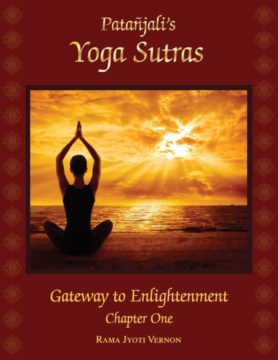The Yoga Sūtras are a pathway for enlightenment. Now I don’t personally know enlightenment, I suppose I will recognize it if I ever reach it. What I do know is that the Yoga Sūtras are a manual for a life free from suffering. At a 195 (or 196) aphorisms, the Yoga Sūtras are dense, so packed with information that it requires the guidance of a teacher to comprehend just one line. Rama Jyoti Vernon is that teacher. In her work, Patanjali’s Yoga Sūtras: Gateway to Enlightenment Chapter One, Rama provides clarity and wisdom gleaned from over 50 years of yoga study. It is no small feat to bring this 2,000+ year old work into the modern world. One might call what Rama has done “applied Yoga Sūtra study.”
The discussion of the Yoga Sūtras begins with a brief introduction into yoga philosophy clarifying some of the concepts that appear through the sūtras. Rama then dives into the sūtras. Each sūtra includes the Sanskrit, the translation, and a short discourse that explains the sūtra. Rama then goes into greater depth to unpack the wisdom contained within the one line. This discussion, which includes examples and how you can apply this wisdom, sometimes take 20 pages – which is well worth the read.
 The second sūtra is yogaś citta vṛtti nirodaḥ, which Rama translates as “Yoga is to still or quiet the storms or impulses (waves) that arise in the field of the mind.” Sounds like a great plan, but what are these impulses, where do they come from, what is the field of the mind, and what kind of yoga stills them? This sūtra supplies the reason for practicing yoga, which is not stretchy legs and a nice butt, rather it is a calm and peaceful mind that is still and no longer disturbed by the surrounding chaos. Before we can understand a calm and peaceful mind that is fully present, we must understand the state that it is in right now.
The second sūtra is yogaś citta vṛtti nirodaḥ, which Rama translates as “Yoga is to still or quiet the storms or impulses (waves) that arise in the field of the mind.” Sounds like a great plan, but what are these impulses, where do they come from, what is the field of the mind, and what kind of yoga stills them? This sūtra supplies the reason for practicing yoga, which is not stretchy legs and a nice butt, rather it is a calm and peaceful mind that is still and no longer disturbed by the surrounding chaos. Before we can understand a calm and peaceful mind that is fully present, we must understand the state that it is in right now.
“Mental fluctuations manifest, as thoughts and the effect of unbridled thoughts are emotions. Agitated thought distresses the system and deprives it of light, creating compression and depression, which turn inwards and contract with negative thoughts.”
After a short discussion on this sūtra, Rama delves into the field of the mind, describing the four parts of the mind: the sensing mind, the storehouse/subconscious, the ego or “I-maker,” and the witnessing mind. This in-depth exploration of the four parts of the mind covers many angles and viewpoints. Take the ego as an example. The ego includes our personal ego, a group ego, and a national ego. The ego itself competes to achieve its end, rather than cooperates. The ego is also “the part of the mind that lies and cheats to preserve its own self-interests.” This is often viewed as negative and constrictive. Rama reminds us that when the ego lies and cheats it is an imbalanced form of the ego. The ego, she says, “is actually a wonderful aspect for it preserves and protects the life force of the body and nature. The motivating force of self-preservation is powerful. We do not want to destroy it but transform it.”
Transformation over destruction is such an important concept. When we are the recipient of actions from an unbalanced and intense ego that is all about “I-me-mine,” we often jockey for position and try to control, rein in, or suppress that behavior in others. We rarely see it within ourselves. Rather than try to kill that behavior, we can look deeper and understand that because the ego identifies with separation, it cannot “see behind and beyond the veil of illusion of separation.” Through the process outlined in the yoga sūtras, we can “use the ego to transcend the ego” as it transforms itself into the witnessing mind, or the higher mind.
When the waves of the mind are still, the oneness that already exists is realized. We become established in our wholeness. The sūtras and Rama continue with descriptions of the waves of the mind, how continual practice and non-attachment can still the waves of the mind, the importance of concentration and absorption (samādhi), practices that help to still the mind, and the culmination of meditation known as samādhi.
The Yoga Sūtras are the handbook to an easier way of life. This handbook, written thousands of years ago needs its own manual and Rama has done an exquisite job of translating this pathway into easy steps. Chapter Two of the Yoga Sūtras is in the works, stay tuned for a review!
The book is laid out with an introduction and then each of the 51 sūtras in chapter one gets their own discussion. Peppered through out the book there are journaling questions and exercises meant to inspire deeper connection to the information, or a discussion should you choose to study with others. At the end you will find a self-evaluation to examine what information stayed with you.
Yoga Master Rama Jyoti Vernon continues to spread the wisdom of yoga. She teaches workshop series on the Yoga Sūtras which includes chanting of the sūtras as well as practicing the sūtras within postures (asana). You can find her schedule at www.rama.yoga. Rama’s other book Yoga: The Practice & Myth of Sacred Geometry was reviewed by Ann Friedenheim, LFYP & Mentor, in Research Newsletter 61.
